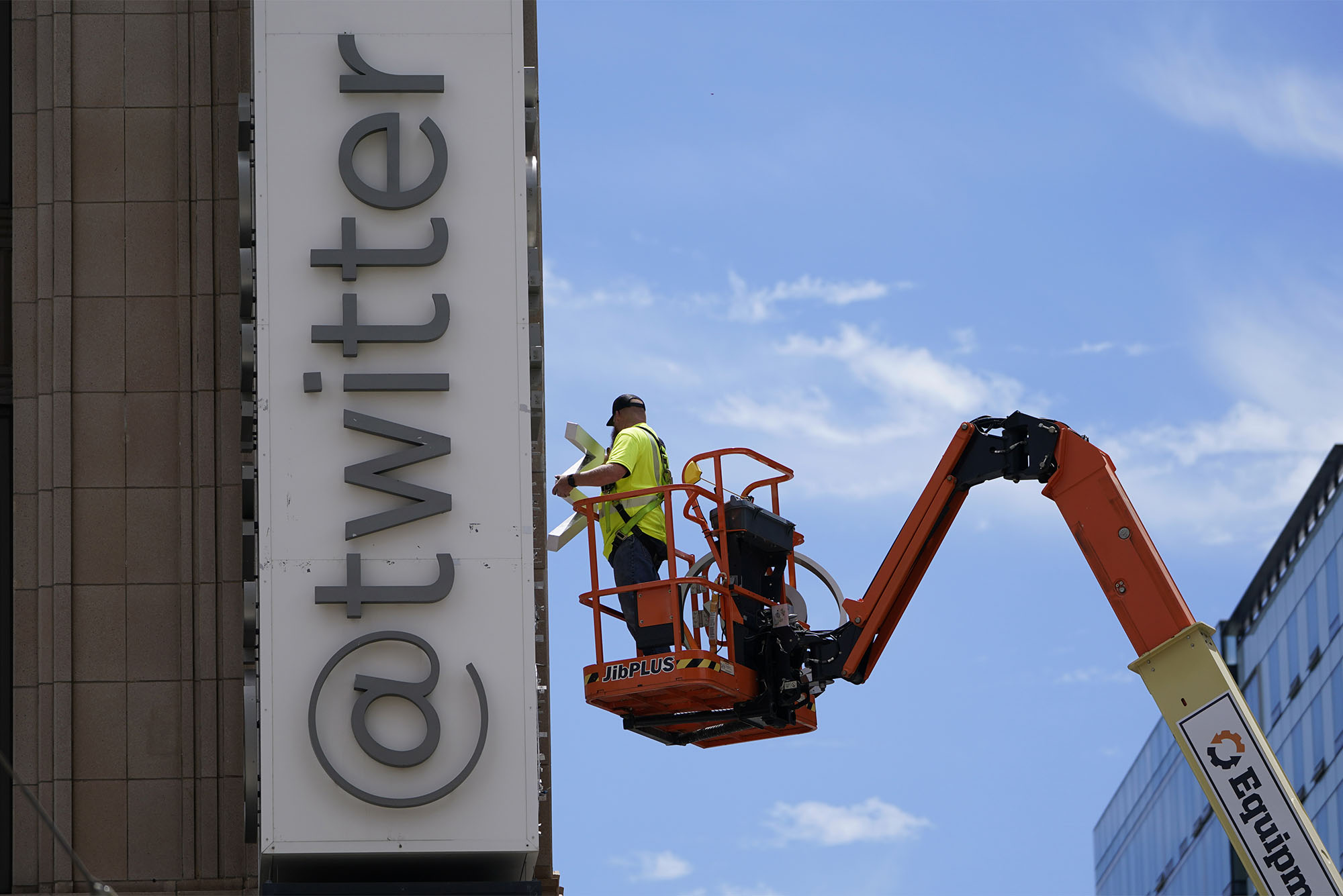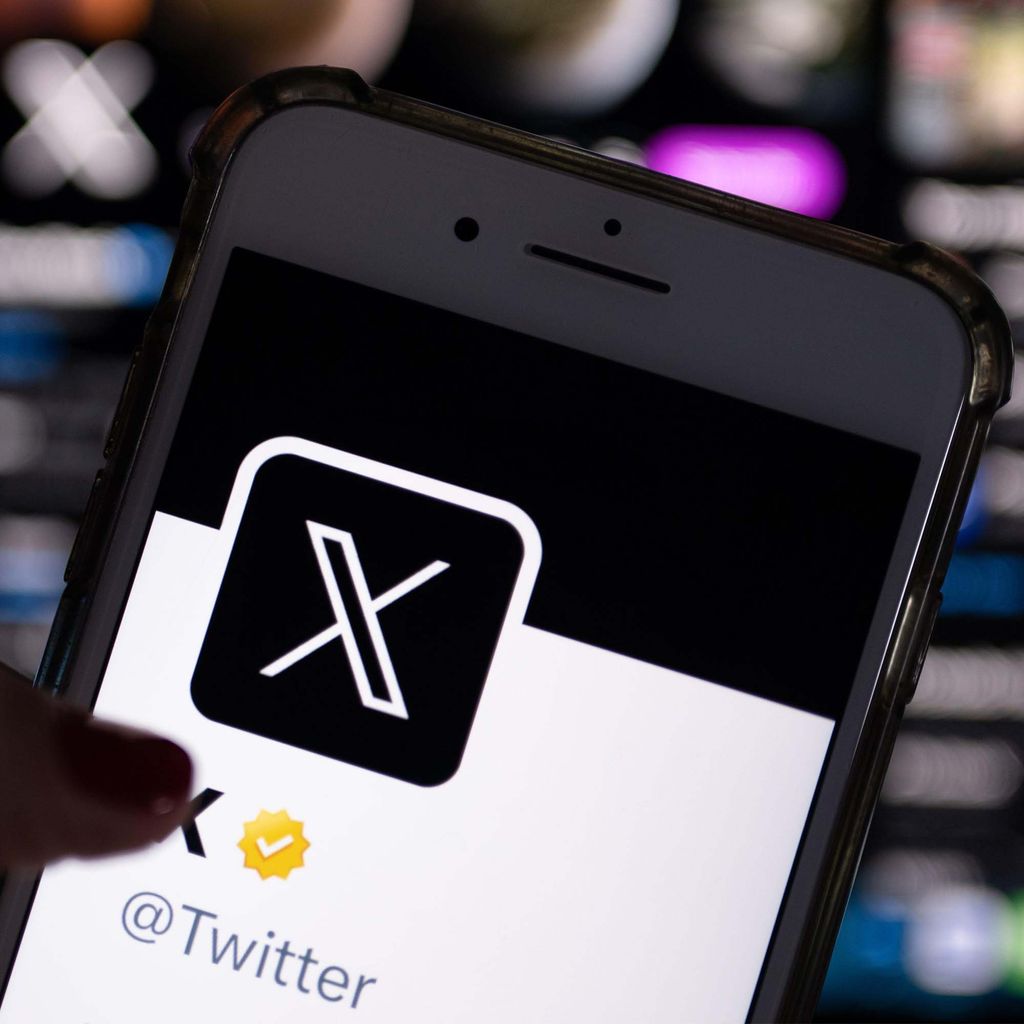Brilliant? Delusional? Understanding Why Elon Musk Changed Twitter to X

A workman removes a character from a sign on the Twitter headquarters building in San Francisco July 24. Elon Musk has unveiled a new “X” logo to replace Twitter’s famous blue bird as he follows through with a major rebranding of the social media platform he bought for $44 billion last year. Photo by AP Photo/Godofredo A. Vásquez
Brilliant? Delusional? Understanding Why Elon Musk Changed Twitter to X
Questrom dean and branding expert Susan Fournier says it’s a huge marketing risk, with potential for huge reward
Twitter is now X. And if you’re scratching your head, then you haven’t been paying attention to Elon Musk at all. Because nothing he does seems to be expected—and that includes spending $44 billion to buy Twitter in the first place back in fall 2022.
But he bought it. Then he took it private. Then he watched advertising revenue plunge 50 percent. Then he faced criticisms over how the social media platform was embracing, encouraging, and promoting disinformation—around everything from the 2020 election to COVID vaccines—while at the same time doing nothing to ban hate speech. He didn’t seem to care about any of that.
And say what you will about Twitter, but it still has north of 300 million users, and its blue bird logo is as instantly recognizable as any logo in the world, right alongside Facebook’s blue and white “f,” McDonald’s Golden Arches, Nike’s swoosh, Apple’s half-eaten apple, and Target’s red and white bull’s-eye.
To make sense of Musk’s latest move, transforming Twitter to X, we spoke with Susan Fournier, who is not only Boston University’s Questrom School of Business dean and Allen Questrom Professor, but is also one of the country’s leading experts on brands and brand recognition. Not surprisingly, she had plenty to say about Twitter, Musk, and the alphabet’s 24th letter.
This interview has been condensed and edited for clarity.
Q&A
With Susan Fournier
BU Today: Let’s start with the risk. When you have a brand and business as instantly recognizable throughout society as Twitter, with hundreds of millions of users, how risky is it to completely rename, rebrand, reposition the company as something totally new?
Susan Fournier: We cannot find another example of this. History supports that this is a rare move. It’s not taken lightly. The reason it’s not taken lightly is that people change their logo, font, colors, even their icon, but to go this far and retire a brand name is something new. It’s a brand name with tremendous recognition, awareness, and recurring salience. Ever since the $44 billion drop, it gets a lot of media play beyond its users.
Then there is the issue of alienating advertisers. It’s a big news cycle. In any world of marketing, building recognition and awareness is a long game, and it’s rare because it’s an asset that’s on the balance sheet, not just because of people’s usage and the awareness it gets. People don’t have to wonder what it is. Achieving that recognition takes a ton of time and costs a ton of money.
BU Today: Is that why so few—if any—companies take this kind of drastic step?
Susan Fournier: People tend to want to hold on, and there is usually still heritage even in the face of negativity. You do some moves, like maybe change corporate names, but still people hold on to the brand. Look at Tylenol. People perished [in the 1982 Tylenol poisoning murders]. Tylenol could have walked away from its name, but they didn’t.
BU Today: A few major tech companies have changed their corporate names, however. Is that similar to this? Facebook and Meta. Google and Alphabet.
Susan Fournier: You get a corporate rebrand like Meta, that’s about trying to get bigger. But they kept their primary brand. We saw Philip Morris become the Altria Group to look for a rebirth. But they kept Marlboro.
BU Today: Right, but this change sounds like Musk is not keeping the name Twitter. He’s replacing it.
Susan Fournier: It’s incredibly on brand for Elon Musk; this is his MO [modus operandi]. His brand meaning is not following convention, it’s about innovation, doing something that’s different. It would make sense. But he also has a lot of history here, it’s not coming out of the blue. He has Tesla [Model] X, SpaceX, X.com—he has X equity.

BU Today: You sound intrigued by the change.
At a corporate level, at a brand level, there is equity in the letter X that’s intriguing. It’s brilliant to try to own a letter. If you’re going to pick a letter, X is interesting. It’s a mixed bag. You have the X factor, which is perfect, it’s this thing you can’t put your hands on. In math, you solve for X, or you can’t solve for X. But then there is some negative X [association], too. X-rated. Ex-spouse. Even things like extra. Twitter has awareness, it’s in the news all the time—but there is a lot of negativity around Twitter. If you’re going to pick a letter, this is a good one to pick.
BU Today: Do you think that negativity drove the change for Musk?
At some point, maybe it’s just a calculus. Let’s reset this, change the narrative. Stop the bleeding. That’s the big thing. What are you unwilling to give up? How do you value the assets you have? He is not changing the brand. He is dropping the brand asset. That’s a huge risk to me.
BU Today: Is there an upside?
Well, news is worth a bazillion dollars. This is clearly a news cycle item. News is good. There is an opportunity to do a reboot. You can try to start over. Build it with a big picture vision. Yeah, OK, I get that. Musk has a chance to rebuild the message. He can work that in a refreshing way.
BU Today: What about competitors, like Facebook’s new Threads. Could they use this change to their advantage?
I think you’re onto something there. Competition can have a field day with this. They are giving it a new brand without a new product. You almost want to see this unveil [something] that’s radically different that justifies the rebirth. Competitors will lick their chops. What’s X gonna do to try to control the narrative?
I couldn’t help thinking of New Coke [introduced in 1985]. Pepsi took out full page ads in the Wall Street Journal, saying the other guy blinked.
BU Today: What’s your take on Musk?
Maybe he’s delusional, maybe he’s brilliant. I do think, when we are looking at history and see that no one does this, sometimes they are being delusional. If you’re going to change it that much, just get rid of the brand and start over. I applaud the bravery. I do think sometimes we delude ourselves and hold on to things that maybe can’t be changed.
Comments & Discussion
Boston University moderates comments to facilitate an informed, substantive, civil conversation. Abusive, profane, self-promotional, misleading, incoherent or off-topic comments will be rejected. Moderators are staffed during regular business hours (EST) and can only accept comments written in English. Statistics or facts must include a citation or a link to the citation.